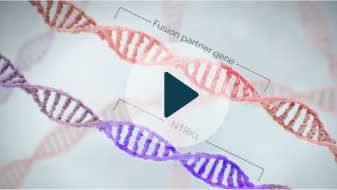NTRK Gene Fusions
TRK receptors are encoded by the neurotrophic receptor tyrosine kinase genes (NTRK1, NTRK2 and NTRK3). TRK receptors receive signals from outside the cell via ligand binding and propagate those signals to activate pathways involved in cell proliferation, apoptosis, and angiogenesis, including Ras/MAPK, PLC, and PI3K.1
The most common mechanism resulting in the constitutive activation of TRK receptors is via the chromosomal rearrangement of the NTRK gene, which causes fusion between the NTRK gene containing the kinase domain and a different, unrelated gene.2
This causes constitutive, ligand-independent TRK kinase activity, resulting in overstimulation of downstream signalling pathways and unrestricted tumour growth.1-3
NTRK gene fusions encode for TRK fusion proteins which are the oncogenic drivers of TRK fusion cancer. TRK fusion cancer occurs in multiple tumour types in both adult and pediatric patients.2
Research has identified NTRK gene fusions in more than
2 dozen types of common and rare solid tumours1,4-6

NTRK gene fusions may be found across various adults and pediatric tumour types1,4-6
LUNG CANCERS
SALIVARY GLAND CANCERS
SARCOMAS
CNS CANCERS
PEDIATRIC CANCERS
THYROID CANCERS
GI CANCERS
Figure includes an example of tumour types which may harbour an NTRK gene fusion and is neither an all-inclusive list nor is it representative of all tumour types in which an NTRK gene fusion may present.
Patients that can benefit from NTRK gene fusion testing
Testing for NTRK gene fusions should be performed for patients with the following tumour types:
- Thyroid cancer (RAI-R and TKI eligible)7,8
- Soft-tissue sarcoma (including KIT/PDGFRA-negative GIST)8,9
- NSCLC (negative for other driver mutations)8
- Colorectal cancer (MSI-H/dMMR and BRAF wild-type)10,11
- Salivary gland cancer2,8
- Primary CNS tumours8,12
- Melanoma (BRAF wild-type)8,13
- Pancreatic cancer8,14
- Biliary tract cancer8
- Pediatric cancer15
- Other, including tumour types known to frequently harbour NTRK gene fusions: infantile fibrosarcoma, congenital mesoblastic nephroma, mammary analogue secretory carcinoma, and secretory breast cancer2,16
NTRK = neurotrophic tyrosine receptor kinase; TRK = tropomyosin receptor kinase; MAPK = mitogen-activated protein kinase; PLC = phospholipase C; PI3K = phosphoinositide 3-kinases; RAI-R = radioactive iodine refractory; TKI = tyrosine kinase inhibitor; KIT = c-kit receptor tyrosine kinase; ; PDGFRA = platelet-derived growth factor receptor alpha; GIST = gastrointestinal stromal tumour; NSCLC = non-small cell lung cancer; MSI-H = microsatellite instability-high; dMMR = mismatch repair deficient; BRAF = proto-oncogene B-raf; CNS = central nervous system.
References:
1. Amatu A, et al. NTRK gene fusions as novel targets of cancer therapy across multiple tumour types. ESMO Open. 2016;1:e000023.
2. Cocco E, et al. NTRK fusion-positive cancers and TRK inhibitor therapy. Nature Reviews Clinical Oncology. 2018;15: 731–747.
3. Davare, et al. Detecting and targeting oncogenic fusion proteins in the genomic era. Biol Cell. 2015;107(5):111-2.
4. Vaishnavi A, et al. TRKing Down an Old Oncogene in a New Era of Targeted Therapy. Cancer Discov. 2015;5(1):25–34.
5. Okimoto RA, et al. Tracking down response and resistance to TRK inhibitors. Cancer Discov 2016;6(1):14–16.
6. Lange AM, et al. Inhibiting TRK proteins in clinical cancer therapy. Cancers. 2018;10(4):E105. doi:10.3390/cancers10040105.
7. Chu Y.-H, et al. Clinicopathologic and molecular characterization of NTRK rearranged thyroid carcinoma (NRTC). Mod Pathol. 2020, 33(11):2186-2197.
8. Rosen EY, et al. TRK Fusions Are Enriched in Cancers with Uncommon Histologies and the Absence of Canonical Driver Mutations. Clin Cancer Res. 2020,26(7):1624-1632.
9. Demetri GD, et al. Diagnosis and management of tropomyosin receptor kinase (TRK) fusion sarcomas: expert recommendations from the World Sarcoma Network. Ann Oncol. 2020, 31(11):1506-1517.
10. Cocco, et al. Colorectal Carcinomas Containing Hypermethylated MLH1 Promoter and Wild-Type BRAF/KRAS Are Enriched for Targetable Kinase Fusions. Cancer Res. 2019; 9(6):1047-1053.
11. Chou A, et al. NTRK gene rearrangements are highly enriched in MLH1/PMS2 deficient, BRAF wild-type colorectal carcinomas—a study of 4569 cases. Mod Pathol. 2020, 33(5):924-932.
12. Torre M, et al. Molecular and clinicopathologic features of gliomas harboring NTRK fusions. Acta Neuropathol Commun. 2020, 8(1):107.
13. Forschner A, et al. Gene fusions in melanoma: detection, prevalence and potential therapeutic implications. J Dtsch Dermatol Ges. 2020, 18(12):1387-1392.
14. Gupta M, et al. Targeting the NTRK Fusion Gene in Pancreatic Acinar Cell Carcinoma: A Case Report and Review of the Literature. J Natl Compr Canc Netw. 2021, 9(1):10-15.
15. Perreault, et al. Canadian Consensus for Biomarker Testing and Treatment of TRK Fusion Cancer in Pediatric Patients, Curr Oncol. 2021. 28(1): 346-366.
16. Zhao X, et al. NTRK Fusions Identified in Pediatric Tumors: The Frequency, Fusion Partners, and Clinical Outcome. JCO Precis Oncol. 2021, 1:PO.20.00250.
The FastTRK Complimentary Testing Program may be updated over time. Make sure you visit this site to check for updates.



